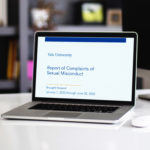
Vaibhav Sharma, Photo Editor
University President Peter Salovey joined 57 other university leaders from across the globe in signing onto a statement affirming their commitment to a set of goals around combating climate change.
On March 24, Zhejiang University in China hosted the Global University Presidents’ Online Forum: Role of Universities in the 2030 Agenda. It was the first global online forum for university leaders. Leaders from universities in 30 countries attended, and all of them signed onto a statement of commitment to sustainable development goals. At the event, Salovey and other university leaders shared how they might meet the goals of the 2030 Agenda for Sustainable Development, which United Nations member states adopted in 2015, given that the pandemic has slowed progress toward those goals.
“With their unique advantages in generating knowledge, uniting stakeholders and enabling transformation, leading universities around the world should play an active and essential role in forging a sustainable future through dialogue, solidarity and collaboration,” the statement reads.
There are five key aspects of the sustainable development goals: implementing sustainable development, improving sustainable development competence, supporting scientific research that responds to worldwide challenges, collaborating with global partners on innovative solutions and cooperating transnationally on specific issues.
According to Zhejiang University President Zhaohui Wu, the forum was designed to bring together leaders from the world’s top universities to share how they have carried out sustainable development goals and explore opportunities for future collaboration.
Officials from the United Nations spoke at the event, including Nikhil Seth, U.N. assistant secretary-general, and Stefania Giannini, UNESCO assistant director-general for education.
“The organization of the forum is timely, especially given the increasingly pivotal role of universities not only in fostering understanding and knowledge, but also in contributing to the building of knowledge-based societies and for the achievement of the Sustainable Development Goals,” Giannini said at the forum.
Salovey also spoke at the forum. He highlighted how Yale is drawing from the expertise of its faculty to address climate and environmental change, Salovey told the News.
Additionally, his comments addressed the Planetary Solutions Project, which is one of Yale’s five priorities for scientific investment. The project aims to solve the problems of human-caused climate crises. It is an area of focus across the University – from engineering to law and economics to health, Salovey added. Every academic department or school at Yale has at least one faculty member whose scholarship relates to the sustainable development goals.
Salovey’s speech also addressed Yale’s history of preparing students to work across sectors to solve challenges.
“For example, in 2018, William Nordhaus, a Yale alumnus and Yale Sterling Professor of Economics, was awarded the Nobel Prize in Economics for transforming our understanding of the costs of environmental degradation and climate change,” Salovey wrote in an email to the News. “Other Yale graduates are at the helm of governments, businesses, nonprofit organizations, and research enterprises that focus on addressing climate and environmental change.”
Nordhaus and other experts have helped cut greenhouse gas emissions on Yale’s campus — the University has reduced greenhouse gas emissions by 43 percent over the last 15 years, while the campus square footage has grown considerably, Salovey said. In 2015, the University launched a carbon charge program based on the ideas and suggestions of Nordhaus and other experts. This initiative is among the first of its kind in higher education, Salovey said, and Yale has committed to carbon neutrality by 2050.
But students have called on the University to do more to combat climate change, urging Yale to set a more ambitious goal of carbon neutrality by 2030. Additionally, a coalition of student activists have gained widespread attention for protests calling on Yale to commit to divesting its $31.2 billion endowment from fossil fuels.
More than one million people across the globe tuned into the live-streamed event, according to Zhejiang University.
“More equal and mutually beneficial partnerships must be developed upon scientific principles, academic values, a shared vision and shared goals which place people and the planet at the centre,” Svein Stolen, rector at the University of Oslo, wrote in a Zhejiang University press release.
Signatories on the statement included Yale, Harvard University, the National University of Singapore, Stellenbosch University and Universidade Estadual de Campinas.
Rose Horowitch | rose.horowitch@yale.edu










